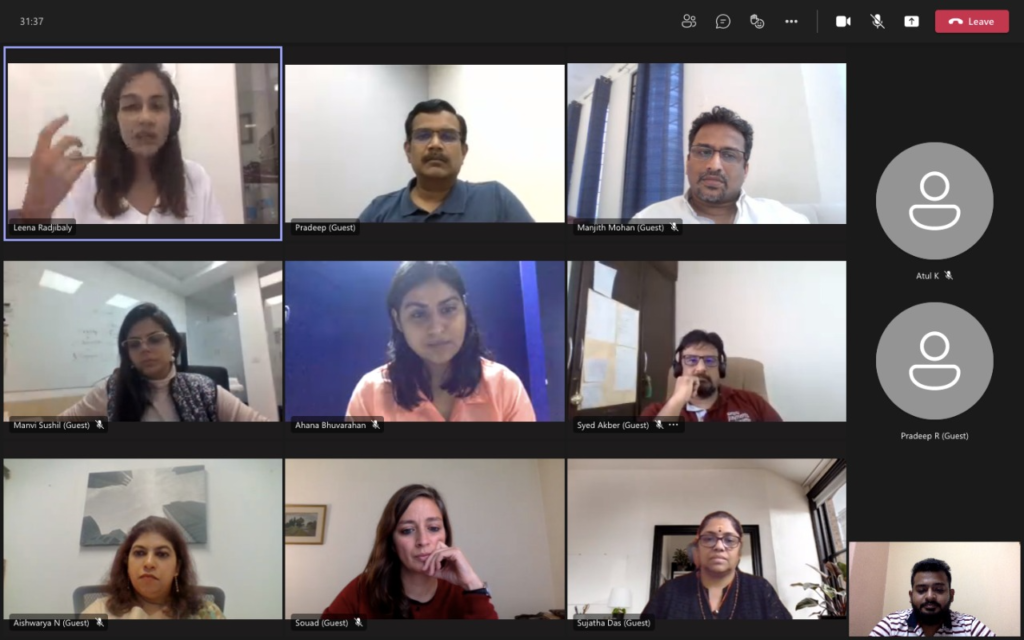Developing Future Capabilities in the Digital Age.

“Every organization needs to become a learning organization to answer to the new needs of customers and adapt to the pace at which innovation is taking place.” Souad Tenfiche, CEO Link
At Link, we have been working closely with multiple corporates and startups to build an agile, innovative and customer-centric culture within their organizations. We believe in the power of collective intelligence and our wish is to create a community of HR and L&D leaders coming from various backgrounds and industries to brainstorm and share best practices on the future of organizations.
On November 18th 2021, we hosted the first edition of our HR and L&D Roundtables on the topic of Developing Talent and Innovation Capabilities. The idea of our roundtables is to create a safe space for leaders to interact, exchange ideas, share challenges and learn from each other.
The panellists of the discussion were,
- Aishwarya N, Asst. GM Learning & Development at Brigade Hospitality and Learning & Development Lead for Brigade Group
- Akber Syed, Head Learning & Development at a leading payments technology company
- Manjith Mohan, Leadership Team and Head of Learning & Organizational Development at the Chola Murugappa Group
- Pradeep R, Head of Human Resources at Dassault Systemes Solutions Lab, India
- Sujatha Das, Sr. Director Human Resources at Tavant Technologies
- Manvi Sushil, Director Human Resources South Asia at Avery Dennison
- Souad Tenfiche, CEO at Link and VP at La French Tech
The identified themes for the event centred around various people and capability missions, expected and on-ground impact, learnings and experiences especially when accompanied by an unexpected disruptor such as the pandemic. Some of the topics in focus were,
- How to change the culture internally towards more innovation?
- How to build a talent strategy and capabilities to address new and unmatched needs for more customer-centricity?
- The shifting role of the people function and enablers for HR teams
When we kicked off the discussion about the impact the pandemic had on our team, the speakers observed that what stood generally as “soft skills” had become invaluable and crucial in driving business outcomes.
“The soft skills that organizations were not allowing in meeting rooms became crucial to set the context of empathy and sensitivity in a remote mode” shared one of our speakers.
The top wanted soft skills were empathy and emotional intelligence, resilience, agility, problem-solving, critical thinking, creativity, innovation mindset, storytelling and collaboration. It’s an imperative need today to adapt how we train people, develop leaders, and enable them to learn in the longer run.
While every organization has held its mix of upskilling approaches and formats, not all of them always perform in the way they were envisioned. Several elements contribute towards failure, one of the most noteworthy of which is – the organizations failure to view the people function as
a strategic partner.
Secondly, developing new skills and formats cannot be achieved using the same methodologies of the past. Modules should be designed based on an individual’s strengths, competencies, and behavioural background and the data available to the organization. And, lastly, it’s important to
empower the teams by providing upskilling modules in various formats to suit different learnings needs and learning styles (audio, video, learning by doing, theoretical and practical).
This discussion inherently evolved into aspects that help large organizations today build culture that creates both agility and innovation. Notably, our speakers had a lot of experience and ideas in this area, and we’ve listed some of their best practices,
- Leverage the power of hyper-collaboration: The HR function has to support collaboration with the organization’s external ecosystem to create more value and to help attain strategic and business goals rapidly. For example, an L&D leader shared his organizations pivotal strategy in collaborating with their industry competitors, playing to each others’ strengths rather than competing with each other.
- Working with cross-functional teams is a key success factor to leverage collective wisdom to better solve, better problems.
- Don’t start with your leadership, start from the team: The best people to solve problems are the ones who are the closest to the customers.
- Use existing digital platforms to support innovation: While digital tools have been adopted in every organization today, they remain an enabler to create an innovative culture. The most crucial aspect is that innovation has to be a culture in the organization.
We would like to thank our amazing speakers again! Their inputs and insights were truly invaluable and we look forward to organizing the 2nd roundtable on the promising topics discussed with our leaders!
About Link – We are an innovation hub deeply rooted in the French and Indian ecosystems. We accelerate startups’ growth and help corporates create an agile and collaborative culture to reach their strategic goals and drive more innovation. During more than 20 years of close contact with entrepreneurs, we have developed unique expertise in supporting cultural transformation in an organization. Today, we have developed our own hybrid methodology at the crossroads between Design Thinking and Lean Startup methodologies to accelerate the creation of innovative products and services.
Do you wish to join our community of HR and L&D leaders? Get in touch with us at
[email protected]
Recent Posts
- How we assisted a prominent jewellery brand in India to enhance customer experience by streamlining billing processes and reducing turnaround time.
- How we developed an acceleration program involving internal teams for India’s largest food and beverage company.
- How we supported a multinational energy and petroleum company to promote a culture of customer centricity across various functions.
- How we empowered high-potential executives at a Swiss manufacturer of escalators, moving walkways, and elevators to leverage design thinking methodologies in crafting innovative products and services.
- How we guided Indian employees of an American pharmaceutical company to adopt the practice of identifying precise problem statements before delving into solution mode.